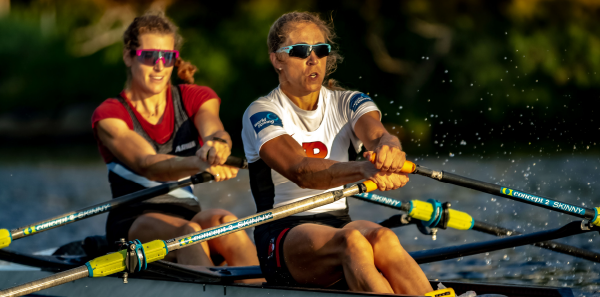
Genevra “Gevvie” Stone, MD, was working at a summer camp when she realized emergency medicine was the perfect specialty for her.
Explore This Issue
ACEP Now: Vol 40 – No 09 – September 2021Ominous thunderstorms were rolling in fast. Dr. Stone, the camp’s lead sailing instructor, was responsible for getting every young sailor back to shore immediately so they could shelter from the storm. For 10 frenzied minutes, Dr. Stone calmly orchestrated the safe return of every camper. Managing the waterfront chaos brought out the best in her, and she relished the adrenaline rush. “I realized that this is what I get to do every day in the emergency department—help people and manage chaos,” she remembered. “I felt so lucky.”
Despite her sailing experience, Dr. Stone’s ability to manage pressure-packed situations was formed in a different type of boat. The daughter of two Olympic rowers, she tried other sports before her natural ability in the shell was too much to ignore. She rowed for Princeton University’s crew before moving on to the USRowing under-23 circuit. While she was getting faster and faster on the water, she never let off the gas with her medical training.
Balancing Medicine and Rowing
For the past decade, she has been a duck, gliding smoothly between her scrubs and scull, all while paddling furiously underwater—literally and figuratively—to keep everything afloat. After an incredible career spanning three Olympic appearances and one silver medal, Dr. Stone made the transition from one high-stakes situation to another in August 2021, trading her red, white, and blue unisuit for the pastel personal protective equipment donned by her newest crew at Beth Israel Deaconess Medical Center in Boston.
Like many athletes on the path to the Tokyo Olympics, Dr. Stone was deeply disappointed when the pandemic forced the games to be delayed a year. The decision to train for the 2020 Games wasn’t one she took lightly. Back in 2017, she was rowing recreationally but clocking faster times than ever. When she started beating her own silver medal time from the Rio Olympics, she couldn’t help thinking about trying for Tokyo. She already had an on-again, off-again schedule with medical school and residency because of her previous two Olympic cycles, so she knew taking time away during her residency would pose challenges.
With the support of her residency director and her fellow residents as some of her biggest cheerleaders, she decided to take a two-year leave from her residency to train for Tokyo 2020. “Not many people have this opportunity,” they told her. “You have to do it!”
Dr. Stone stayed as involved with her EM program as she could, participating in didactics and research projects.
By spring 2020, she was in peak physical condition and ready for the USRowing trials. When the delay was announced, the prospect of adding a full year of rigorous training to her calendar was a hard adjustment. “My mind and body were not prepared for it,” Dr. Stone explained. Even though the finish line kept moving further away, she kept going.
She stayed in touch through her residency’s active group text thread, watching her friends use humor to cope with the stress of pandemic conditions. She offered to return to help at the hospital, but her program directors didn’t want to risk exposing her to the virus.
She empathized with her EM peers, but she was living a different reality. After a few too many “thanks for all you do” comments from well-wishers at the grocery store, she stopped wearing her favorite scrubs as sweatpants. When pandemic guilt threatened to distract her too much, Dr. Stone refocused on what she could control. She wanted to see her Olympic dreams through as a thank-you to everyone who made her dual dreams possible. “I had to fully engage [in my training] and make them proud,” Dr. Stone said.
At the USRowing trials, she placed second with one of her fastest times ever for single sculls, but only the first-place finisher gets to race the single at the Olympics. In true emergency physician fashion, she moved immediately to plan B. She teamed up with a partner and successfully earned her spot on her third consecutive Olympic team, this time competing in double sculls.
Tokyo and Beyond
Dr. Stone’s experience in Tokyo was an exciting and somewhat bizarre whirlwind, set apart from her previous Olympic appearances by the frequent COVID testing and plexiglass partitions in every cafeteria. “We got really good at thinking about lemons while we spit in tubes,” she said with a laugh. It was weird that fans couldn’t attend the races, but she joked, “We’re rowers, so we’re not used to having a lot of spectators at our events!”
Dr. Stone and her teammate raced well enough to make the finals in Tokyo, finishing in fifth place. After that race, she embraced the end of her championship career (she’ll be moving on to masters-level rowing competitions now) and was ready to turn her attention back to emergency medicine. Still, her Olympic appearances may not be over. She hopes to complete a sports fellowship with the goal of becoming a team physician for USRowing.
Returning to residency in the middle of a COVID-19 surge isn’t how she pictured it, but her time on the water has taught her how to weather tough conditions. “I had someone ask me in an interview, ‘Won’t it be hard to return to medicine?’ I told them yes, it will absolutely be challenging. But something being challenging has never stopped me before.”
Pages: 1 2 | Multi-Page





No Responses to “After Competing in Tokyo, Olympic Rower Returns to EM Residency”